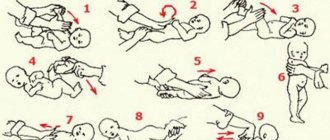General requirements for music for newborns
Adults can listen to whatever they want. However, not every melody will be equally useful for the baby. The choice of background music for babies, and even more so that which will be used purposefully, must be approached consciously.
The child begins to hear and perceive the first sounds at 16 weeks. At first it’s just the beating of a mother’s heart. Then - her voice, the voices of those around her. After birth, the baby enters a world full of sounds. They become much louder and clearer.
In the first six months, they merge into almost one continuous cacophony, from which the baby learns to identify the ones he needs. Hearing continues to develop, and the hearing organs complete their formation.
To speed up these processes, it is recommended to talk to the child, sing to him, and play compositions.
However, you need to remember that not all music can be used for newborns:
- slow calm melodies;
- the major key is mainly used;
- cheerful music for children is played in the morning to promote awakening, or during games and activities;
- compositions should not contain sharp transitions, changes in rhythm or volume;
- short duration of works: up to 5 minutes;
- Focused listening should take 10 to 20 minutes a day, preferably broken into 5-7 minute blocks throughout the day.
Kids perceive instrumental music well when only 1 musical instrument is used or its part is clearly displayed, the rest of the “orchestra” sounds in the background. The piano and violin are especially good.
It is also recommended to use nature sounds in the background: rain, birdsong, rustling leaves and grass. In cities, people experience a shortage of natural sounds.
The most pleasant sound for a baby is the mother's voice. Therefore, there is no need to be shy about singing, telling poems and nursery rhymes. For a child, this is a type of communication with his mother.
About classical music for newborns up to 1 year: soothing and for sleep
The influence of music on the development of children has not yet been fully studied. There is ongoing debate about the proven effectiveness of listening to classical music to improve the mental abilities of a newborn.
All scientists and pediatricians agree on one thing: properly selected music has a positive effect on the emotional state and harmonious development of the child.
Classics for newborns occupy a special place at an early age.
Baby and piano
Choosing music for newborns
The baby can hear individual sounds even in the mother’s tummy in the second trimester of pregnancy. Already during this period, mother is recommended to turn on her favorite compositions - music brings her pleasure, calms her, and lifts her spirits. Such changes have a good effect on the child’s condition.
Music for pregnant women
After birth, the baby's hearing is not yet sufficiently developed. He distinguishes his mother's voice and reacts to sharp, loud noise. All other sounds merge, creating a multi-voiced background that affects the baby’s subconscious. Thus, when turning on music for a child in infancy, you should be sure of its quality.
Important! The best melody for a newborn, without a doubt, is the mother's lullaby. The soft, soothing melody of a native voice has a magical effect on the baby, soothing, and giving a feeling of security.
It is recommended to start getting acquainted with the world of music with classics for babies - it harmonizes the child’s emotional state, has a positive effect on brain development, and trains the ear.
Children who listen to music from birth have a good sense of rhythm and catch the slightest changes in tones and sounds. In the future, this feature will help them in learning foreign languages and dancing.
In addition, the child learns to concentrate and develops memory.
Baby and notes
Worth understanding! Not all works are equally useful for infants to listen to.
When choosing classical music for babies under 1 year old, it is recommended to exclude the use of certain creations:
- Works performed by a symphony orchestra and using brass instruments are filled with harsh, varied sounds and are poorly perceived by children.
- Opera arias. The child does not perceive the classical performance and is irritated by the unnatural singing style for him.
- Intense, emotional works - while listening to them, the child worries, experiences stress, and gets nervous.
You can correctly use the positive influence of classics for infants by adhering to simple rules:
- Include melodies performed by one instrument - piano, harp, violin, guitar. Such works are well perceived, remembered, and attention is easily concentrated.
- Use light, soft, calming music. Melodies should be smooth, without sudden changes in volume and rhythm.
- Babies should be taught to listen to music gradually, a few minutes a day.
- Do not use low frequency melodies.
Important! When playing classics for kids, you need to pay attention to their reaction - if the slightest dissatisfaction appears, listening to music should be postponed for a while.
Children respond well to the monotonous sounds of nature: the sound of rain, wind, sea, the murmur of water in a waterfall, as well as the sounds of animals and birdsong.
When to play classics for your baby
The use of classics will be useful not only if it is of quality and the right choice. You also need to choose the time frame for listening to music wisely.
You can turn on the classics during the following periods:
- Before bedtime. To help you fall asleep easily, lyrical, calm melodies are used, reminiscent of the flow of a river. The most popular are works by Beethoven, Chopin, lullabies by Glinka, Mozart for babies.
- During the waking period. Cheerful, life-affirming motifs and fast rhythm are the main characteristics of works for listening while playing or walking in a stroller. They lift your spirits, calm you down, and activate your brain. You can use works by Mozart, Vivaldi, Bach, Beethoven, Schubert.
- While eating. Studies have been conducted that have established a connection between listening to music and an increase in appetite. One condition is that the motives must be cheerful, active, but not contain sudden jumps in rhythm.
Interesting. Classical music has a good effect on newborns during massage sessions or performing sets of developmental exercises - it perfectly distracts the baby.
As your child approaches one year, you can play children's songs and music from cartoons.
Sleeping with classics
Where to get classics for children
With the development of modern technology and the Internet, choosing classical works for children to listen to is not difficult. As soon as you enter the query “classical music for newborns” into the search bar, a list of sites and services appears where ready-made collections are posted.
These selections are compiled based on the recommendations of pediatricians, psychologists and scientists, taking into account the age of the children. The works can be listened to online or downloaded to your gadget.
Another way is to select compositions yourself, taking into account your own preferences and feelings.
List of works for children
Clothes sizes for newborns
Mozart for newborns is characterized by its high effectiveness on child development. Research has proven that while listening to the works of the Austrian composer, all areas of the human brain are activated. This effect is caused by the high frequency of the compositions and the special rhythm of increasing and decreasing the volume.
Mozart's music for newborns stimulates the mental functionality of the brain, improves memory and concentration.
The compositions of the Italian composer Antonio Vivaldi have a positive effect on the harmonious development of the baby. His works are unusually melodic, life-affirming, sunny. They can calm well, improve the emotional state, and activate the baby’s mental activity.
Ludwig van Beethoven's compositions are lyrical, refined, sensitive, and inspire a love of art, a sense of beauty and tenderness. They are able to develop creative abilities in a child, balance, form perseverance and perseverance.
The best songs for children:
- Mozart – serenades, sonata for piano, sonata for two pianos, concerto for piano and orchestra No. 20. The compositions have a positive effect on mental functionality and increase brain productivity. It is recommended to listen while playing or practicing.
- Beethoven - Moonlight Sonata No. 14. Light, gentle sound, slow soothing tempo give peace, tranquility, and a feeling of happiness. Doctors often use this melody during massage.
- Vivaldi - Seasons, especially the Winter part. A melodic work that has a magical effect on capricious children, brings a sense of harmony and faith to the fairy tale. The best choice for listening before bed.
- Strauss is a Polish Trick-Truck. Active, but light and airy composition. A great way to entertain your baby is to dance and jump. Over time, you can add other waltzes and polkas.
- Saint-Saens - Carnival of Animals. The work consists of 14 short parts, the basis of which is the sounds of animals. The best composition for the development of a child's speech and communication skills.
- Rimsky-Korsakov - Flight of the Bumblebee. An active work that stimulates the development of imagination.
- Schubert - Ave Maria. A wonderful composition, fascinates with tenderness, magic, inspires, gives faith in the best.
The compositions “Andante” by Mozart, “Waltz of the Flowers”, “Children’s Album” by Tchaikovsky, “Morning Mood” by Grieg, “The Snow Maiden” by Rimsky-Korsakov are also often used.
Rules for Effective Listening
In order for the effect of listening to classical music to be maximum and not cause harm, you must follow some rules:
- Do not use headphones. The baby perceives a diffuse sound, but a localized one can cause a shock effect.
- Don't play music loudly. Quiet sound is better perceived and does not irritate the baby.
- Cheerful, rich compositions are recommended to be used while awake, lyrical, calm - before bed.
- In the first months of life, you should not visit noisy places or events - unfamiliar noise makes the baby nervous.
- It is not recommended to play heavy rap and rock music for your child - it is too aggressive for children's perception.
- You should not overuse the classics - the total listening time should not exceed one hour a day.
Baby wearing headphones
There are also contraindications to the use of classical music for the development of a baby:
- Tendency to seizures.
- Otitis.
- Deviations in intracranial pressure.
- Bad feeling.
Listening to music should bring joy, tranquility, and harmony. At the same time, mother should not forget about singing lullabies, cute children's songs, telling rhymes and fairy tales - this is the best way to interest the child, stimulate the development of speech and communication skills.
The positive influence of classical music on the development of newborns is an indisputable fact. Properly selected compositions help you sleep, relax, calm, increase mental abilities, and develop creativity.
Source: https://kpoxa.info/raznoe/klassicheskaya-muzyka-dlya-novorozhdennyx.html
Influence of classical music
Scientists have long proven the benefits of classics for children.
They even compiled a list of composers whose works are recommended to be listened to in different situations:
- Chopin, Strauss help get rid of anxiety;
- a calming effect was noted in the compositions of Beethoven and Schubert;
- Bach recordings help relieve stress;
- Mozart and Khachaturian inspire cheerfulness and optimism;
- Tchaikovsky and Mendelssohn help improve concentration.
Listening to classical compositions not only allows you to level out the baby’s emotional state, but also helps him develop intellectually. Parents themselves note the beneficial effects of classical music on children. They often stage their favorite works and select those that the kids like.
Mozart's music deserves special attention. The compositions contribute to the intellectual development of the child.
The fact is that melodic transitions and vibrations in the works coincide with the biorhythms of the brain, which contributes to its work and development, and has a beneficial effect on the creativity, intelligence and attention of the newborn.
This is why experts advise children to play Mozart. They even compile a list of songs recommended for listening.
What music is good for newborns?
Doctors say that music has a huge impact on how a child will develop. With its help, children can develop good memory, ability to concentrate and other qualities. Music is also useful for newborns because it introduces them to a variety of emotions.
At the same time, it is very important what kind of melodies a newborn baby hears, since not all of them will be equally useful for him. The child must decide on his own choice of favorite music in the future, but until that moment, parents should pay their own attention to this.
Interestingly, music affects children's ability to learn foreign languages. The fact is that it teaches the child to distinguish the subtle nuances of the sounds that he hears.
Is it possible to play music for newborns?
Children first become acquainted with the world of sounds even when they are not yet born. The first sound he can perceive is his mother's heartbeat. A little later, the child begins to hear the voices of the people his mother is talking to. After birth, sounds become clearer and clearer, but still the process of hearing development is gradual.
The hearing organs of newborns are not yet fully formed, but parents can help this process.
To do this, you need to use relaxing music, as well as talk to your baby as much as possible, in particular, read children's books to him. Music should help a newborn child find peace and cope with worries.
Scientists believe that children whose parents allow them to listen to calm music become more intelligent and intelligent in the future.
What kind of music is good for a child to listen to?
Under no circumstances should fast and energetic melodies be used, as they will not calm the baby, but, on the contrary, irritate his psyche. Music for a newborn should be calm and positive, not containing negative, much less aggressive notes.
If we talk about the musical instruments used, then preference should be given first of all to the piano, and secondly to the violin, cello, viola and other stringed instruments. It is recommended not to use songs whose duration is more than 5 minutes.
There should be no sudden changes in the rhythm and volume of the melody.
There are also specific recommendations for choosing a music author. It is determined depending on the problem that parents want to solve:
- Rubinstein, Chopin and Strauss help the baby get rid of anxiety;
- Beethoven and Schubert will bring peace to the baby;
- Bach helps the baby relax;
- Khachaturian and Mozart lift children's spirits;
- the music of Mendelssohn and Tchaikovsky helps to concentrate.
It is easy to notice that psychologists recommend mainly the authors of classical, rather than modern music for newborn children.
If we talk about specific works, it is worth paying attention to “Moonlight” written by Claude Debussy, “Winter” from the cycle “The Seasons” by Antonio Vivaldi and “Ave Maria” by Franz Schubert. It is believed that the best music for newborns was written by Mozart.
Regular listening to his melodies raises the child's intelligence level. Scientists claim that this is due to their similarity to biorhythms in the human brain. Melodies from the opera “The Magic Flute” help the development of infants best.
It is also worth paying attention to the child’s reaction to the music selected for him. Each person is individual, and it is quite possible that a baby will not like Mozart’s masterpieces at all. Instead of music, you can use other soothing sounds. For example, the sound of the wavering ocean, the rustling of leaves in the forest, the beautiful songs of birds. You can try using children's compositions from cartoons.
Educational music for babies
It is not necessary to play recordings of musical works for your child. Mom can sing a pleasant and soothing melody to her baby herself. It is important to use them for calming before bedtime, as well as at moments when the baby needs to be dressed or washed.
In this way, the mother will demonstrate her care and love to the baby, which will cause an emotional response.
In general, the more positive emotions both his parents and other people show in the presence of the baby, the more developed he will be.
If you feel creative, try putting on a fun and interesting play at home with good music. This will make the child a more creative person.
What kind of music can't be played?
There are some rules that limit the use of music for the development of a newborn baby. Remember that the baby also needs rest and healthy sleep, and music can interfere with falling asleep. Therefore, you should not turn it on if the baby is sleeping or just resting.
Sometimes parents themselves get tired of music, but still want to constantly create a musical background for their child and use headphones for this. It is not right. The fact is that headphones concentrate sound waves, and this is dangerous for a newborn. It is important that the sound source is located at a distance of more than 150 cm from the baby, otherwise he may suffer hearing damage.
Adults have the skill of concentrating attention on one source of noise, which allows, for example, to carry on a conversation in a noisy party. Children who are less than six months old have not yet developed this ability. Therefore, it is not recommended to take infants to places where many different sounds disorientate them.
There is music that should not be played on children. First of all, we are talking about metal and hard rock. But rap and grunge are also not allowed. These areas negatively affect the newborn’s brain, inhibiting its development.
Monitor the volume level of the music playing from the speakers. Sound waves that are too strong are unsafe for a newborn baby.
It is best to play uplifting, cheerful compositions at the beginning of the day, and before bedtime - slow and soothing ones that will help the baby fall asleep.
During the day, the baby can listen to no more than 3 works, and their total duration should not exceed a quarter of an hour.
The songs that the mother sings to the baby cannot harm. But the rest of the music will have to be abandoned if the child has the following health problems:
- tendency to seizures;
- inflammation of the hearing organs;
- high intracranial pressure;
- the baby is sick.
Music for sleep
Calm, soothing, lyrical compositions should be used as a lullaby. Specifically, you can try using the following works:
- "Ave Maria" by Franz Schubert;
- The Well-Tempered Clavier, written by Johann Sebastian Bach;
- the music of Frederic Chopin, especially his nocturnes;
- "Moonlight Sonata" by Beethoven.
Also in the works of Mozart, Brahms and Glinka one can find lullabies specially written by them.
Music while awake
In such a situation, quick and funny works that can lift your spirits are recommended. Listening to such music helps develop memory, intelligence, and also helps fight stress. The following compositions can be used when the infant is awake:
- "Prelude in C major" by Johann Sebastian Bach, as well as some of his toccatas;
- “Italian Polka” by Sergei Rachmaninov and “Children’s Polka”, written by Mikhail Glinka;
- “Dance of the Sugar Plum Fairy” from “The Nutcracker”, as well as other compositions from this ballet. You can also take “Children’s Album” from the work of Pyotr Tchaikovsky;
- "The Seasons" by Antonio Vivaldi;
- You can take almost any of his serenades from Mozart;
- "Children's Album" by Robert Schumann;
- from Rimsky-Korsakov’s fairy tales you can use “The Snow Maiden”, “The Tale of Tsar Saltan” and “Scheherazade”.
Music while eating
Some melodies help increase appetite, as well as improve food digestion processes. This type of music is useful for newborn babies who need to gain weight. At the same time, the music should not be too fast, as this may cause the baby to rush when swallowing food. You can use the following products to feed your baby:
- you can take “Waltz of the Flowers” from Pyotr Tchaikovsky;
- the orchestrated suites of Johann Sebastian Bach increase your appetite;
- at Johann Strauss's, the best options for lunch are “Snow White Waltz”, “Viennese Waltz” and “Waltz on the Beautiful Blue Danube”;
- Digestion improves by listening to Johann Pachelbel's "Canon".
Using various pieces of music can help develop your baby's intellectual abilities and improve his health, but it is important to follow some rules. Positive classical works will bring benefits, but rock, rap and music with negative overtones will only harm the newborn.
Source: https://babymir.net/kakaya-muzyka-polezna-novorozhdennym/
Songs and educational music
You can play children's songs for the little ones and music from children's cartoons for newborns. Here it is important to select compositions that the baby likes and that do not excite him too much.
The best sounds for a child are the mother’s voice. Therefore, you can and should sing to your child before bed, tell and sing ditties and nursery rhymes.
There is no need to think about vocal abilities: usually the voice itself adapts to the desired timbre, frequency and volume. And vocals develop from training.
Mothers often don’t even notice how they begin to pronounce all the actions or hum during activities with their baby. This is a subconscious manifestation of caring. Meanwhile, the baby’s hearing is trained, a vocabulary is formed, and linguistic skills are developed.
To cheer up your child, you can try to play a home musical. A small performance will appeal to the little one, awaken his interest, and cause new experiences.
Video on the topic
Collection of soothing music for newborns to sleep:
Thus, a pleasant soothing melody before falling asleep and during sleep is useful for newborns and infants. But you need to know which types of music to choose. Classical works (especially Mozart) and jazz are suitable for babies.
The sounds of nature (the noise of tree leaves and rain, birdsong, the voices of dolphins) also have a beneficial effect on the functioning of the nervous system and brain. To get the most out of music, you need to choose the right songs, play them quietly and for a short time.
"White noise"
A concept that has been used relatively recently in pediatrics. White noise is a combination of sounds that creates a monotonous background. In this case, the set can combine sounds of different frequencies and volumes, but at the same time they will merge together, absorbing all other noise and evenly filling the entire frequency range.
The absence of changes or sharp interfering sounds creates a calm environment, which allows the baby to quickly calm down. White noise is often used instead of sleep music for children.
There are natural sounds that create white noise: the sound of a waterfall, the rustling of grass and leaves, the wind, the babbling of a stream. Man-made sounds can also be classified as white noise: the sounds of various devices operating are quite monotonous, for example, a vacuum cleaner, pump, fan, hair dryer, etc.
To create white noise, you can use special audio recordings, or you can create it artificially.
For example, turning on the water tap, starting to vacuum, even turning on the radio on a free frequency. You can whisper or hiss.
Here you just need to observe the child’s reaction: what sounds he likes, which ones cause tension, which ones cause relaxation, which ones become soothing music.
The right background helps:
- falling asleep quickly;
- calm;
- relaxation;
- sound sleep without waking up;
- smoother transition from one sleep phase to another;
- avoiding awakening from sudden extraneous sounds;
- absorption of extraneous noise;
- better quality rest and relaxation.
What music can't be played?
Not all music is beneficial for newborns and infants.
Rest and healthy sleep are important for a baby to develop normally. Loud and disturbing melodies can interfere with rest. Children should not play the following genres to help them fall asleep quickly:
- hard rock (metal);
- club music;
- grunge;
- rap.
These musical styles negatively affect the baby’s brain and inhibit its all-round development. They make the child capricious, whiny, and easily excitable.
Restrictions on music use
Without any restrictions, you can use only mother's songs for babies. These sounds are not capable of harming the baby. Yes, the imama herself will instinctively feel what her baby needs now.
Restrictions when using music:
- You cannot play any compositions while the baby is sleeping or resting. This will interfere with full recovery, the brain will be distracted. At the same time, quiet, calm melodies help you fall asleep. But after the baby falls asleep, the sounds need to be removed.
- Headphones cannot be used . Directed sound may cause acoustic injury.
- Children perceive diffused sound best. It is advisable to install the speakers slightly above the child’s head and at a distance of at least 1.5 m.
- No need to use additional effects.
- Noisy places should be avoided for up to six months. Until this age, the baby has not developed selective hearing, which leads to the fact that all the sounds of the environment merge together, which can frighten the baby;
- It is undesirable to include rap, rock, grunge and other genres where many instruments are used, there are sharp transitions and other difficult-to-perceive moments. This will overload the child’s nervous system and depress it.
- It is advisable to play fast and light melodies in the morning, and calm ones in the evening. This will allow you to correctly form circadian rhythms.
- Don't get carried away . No more than 2-3 works of classics should be played per day.
- Focus on your well-being . If a child is sick, has seizures, or has problems with the hearing organs, then it is necessary to exclude listening to music from the daily routine; a maximum reduction in acoustic load is required.
Music for newborns: what are the benefits and what to include in the “menu” of a little music lover
In stores for newborns, it has become fashionable to arrange a whole display case with all kinds of music for babies. There you can buy “Classics for Kids” and other discs.
Is a baby really able to perceive melodies at an early age or at least enjoy listening to them? What to include on the “menu” of a little musical gourmet? Which works and composers are best suited for infants, and which ones should you stay away from?
Baby's hearing in the womb
It has long been scientifically proven that the ability to hear sounds in a person appears in the womb. By the 16th week, the baby's hearing organs are formed. At 20 weeks he can already distinguish sounds.
At the 6th month, the baby hears absolutely everything that happens inside and outside his “house”: the mother’s heartbeat, voices, TV, traffic noise. A seven-month-old baby is already capable of becoming a “music lover.” Scientists have conducted studies on the effects of the works of certain composers on babies in the womb.
It turned out that the melodies of Brahms and Beethoven have a stimulating effect. The music of Chopin and Vivaldi, on the contrary, calms children. While still in the womb, babies show their musical preferences: they begin to move rhythmically when their favorite works are turned on. I must say that their taste is quite refined.
The vast majority prefers arias from operas, classical works, as well as romances and folk songs. But “pop” and rock music are directly contraindicated for children. Low-frequency sound vibrations, monotonous rhythm and especially volume can frighten a child.
Strong vibrations and sharp sounds can even lead to pathologies in the development of the fetus. Therefore, you need to be careful with modern music, listen to it as little as possible and not turn it on at full volume.
Newborn hearing
When born, the child seems to hear very poorly. This conclusion is easy to draw by observing the sleep of a newborn. In the room where the baby sleeps, the parents talk almost loudly, the TV is on behind the wall - all this does not interfere with the baby, snoring sweetly, watching his dreams.
In fact, in the very first days after birth, the baby's hearing level is slightly reduced. By the time he is discharged from the hospital, he already hears perfectly, he just does not respond to all sounds, since they are still incomprehensible to him.
So, within a few days after birth, the child is open to exploring the wonderful world of sounds.
About the benefits of music
What is music for a modern person? Just a background for getting ready for work in the morning or a friendly get-together? Entertainment or something more? Of course, musical sounds have a special power. And it’s not just about the artistic expressiveness of a particular work.
Have you heard the term “music therapy”? This direction in medicine appeared not so long ago, in the middle of the last century. High-quality, well-chosen music, according to some scientists, can heal. Thanks to it, some forms of autism, as well as anxiety in newborns, can be successfully treated. It has a beneficial effect on humans, animals and even plants.
Therefore, it is not surprising that infants have a keen sense of music, listen to it with interest and enjoy it.
But it's not just about pleasing the baby's ears. Classical music promotes more active brain activity and has a beneficial effect on the development of imagination and memory.
What kind of music should I play for my baby?
- First of all, it's quiet.
- Secondly, non-aggressive.
- Thirdly, smooth, without sharp contrasts.
- Fourthly, it is better to choose chamber music when several musicians play. A symphony concert can overload a child’s psyche; there are too many layers in such music for a child’s normal, calm perception.
- Fifthly, the performance and recording must be of high quality. You should stay away from primitive, homemade recordings where sounds are extracted from a cheap synthesizer. You need to develop good taste from a very early age.
Musical “menu” for babies
On sale you can often see discs with classical music in special children's processing. As recording studios assure, such music is best suited for young children. But it’s not at all necessary to chase “special” disks. From infancy, you can accustom your baby to the original sound of works, the main thing is to choose the right compositions.
What to choose? Albinoni's Adagio, Schubert's Serenades, Beethoven's Moonlight Sonata. You don't have to limit yourself to the classics. Let there be more music, good and different.
Ethnic motifs significantly diversify the “diet” of a young music lover. Songs from good old Soviet cartoons cheer up mother and baby.
Modern pop music is also suitable, but you need to carefully select compositions and include only pleasant, light, calm melodies.
How to turn on music for your baby?
If during pregnancy the mother was not involved in the “musical education” of the unborn baby, then after his birth it is not too late to fill this gap. Literally from the first days of life, you can include various compositions for your baby. Perhaps at first he will not react to them, then he will become interested, get used to it and fall in love with some of the works.
It is best to play calm classical music to your baby before bed to put him in the right frame of mind. You can play a CD while feeding. When a baby begins to suffer from colic and teething, the sounds of his favorite music and his mother’s care will help him take his mind off the unpleasant sensations and make it easier to survive these adversities.
Singing is also good
Not only music is useful for the baby, but also mother’s singing. It is not necessary to squeeze out operatic arias or Russian romances. Ordinary nursery rhymes are quite enough. They can accompany any action: sing when you are going for a walk or when you wash your baby.
A collection of Russian folk nursery rhymes can be found in any bookstore. There is no need to be afraid that a child who is “fascinated” by the works of Bach and Vivaldi will experience culture shock from his mother’s imperfect singing.
Mom’s voice itself caresses the baby’s ears better than any, even the most brilliantly performed classics.
Source: https://zen.yandex.ru/media/id/5d4994de1d656a00aec30a43/muzyka-dlia-novorojdennyh-v-chem-polza-i-chto-vkliuchit-v-meniu-malenkogo-melomana-5e4febfc558768122b01c83c
Where to get classics for children
How to reduce a child's temperature
With the development of modern technology and the Internet, choosing classical works for children to listen to is not difficult. As soon as you enter the query “classical music for newborns” into the search bar, a list of sites and services appears where ready-made collections are posted.
These selections are compiled based on the recommendations of pediatricians, psychologists and scientists, taking into account the age of the children. The works can be listened to online or downloaded to your gadget.
Another way is to select compositions yourself, taking into account your own preferences and feelings.
The benefits of music
Children express themselves through music at an early age: swaying to the beat, jumping, moving their arms, singing their own songs.
It's easier with music:
- learn new words and use them in speech
- share feelings and emotions
- develop motor skills (dance)
Listening to your favorite tunes promotes the production of the hormone dopamine, a neurotransmitter that is often called the “pleasure hormone” in everyday life. It is responsible for memory, concentration, attention, and as soon as its amount in the body increases, a person experiences a feeling of satisfaction. Apparently, this is one of the reasons why music is an important part of world culture.
Newborn hearing
When born, the child seems to hear very poorly. This conclusion is easy to draw by observing the sleep of a newborn. In the room where the baby sleeps, the parents talk almost loudly, the TV is on behind the wall - all this does not interfere with the baby, snoring sweetly, watching his dreams. In fact, in the very first days after birth, the baby's hearing level is slightly reduced. By the time he is discharged from the hospital, he already hears perfectly, he just does not respond to all sounds, since they are still incomprehensible to him. So, within a few days after birth, the child is open to exploring the wonderful world of sounds.
The influence of music on a newborn baby
The child grinds his teeth in his sleep
Classical music of the Renaissance (Vivaldi, violin works of the great Mozart) is positively perceived in infants. The musical sequence coincides with the natural rhythm of a person. Research by scientists has revealed a pattern: Vivaldi’s work “Night” coincides in rhythm with the work of the brain during sleep. Mozart's melodies stimulate emotional upsurge.
Taking into account the peculiarities of infants' perception of musical fragments, special discs have been developed. They contain music for babies: compositions with a heart rhythm, very similar to the rhythms of mommy. Listening to melodies promotes the healthy development of a calm baby.
Children can hear the first sounds even before birth. The approximate time for the beginning of the perception of the musical series is 19-20 weeks. The fetus is able to distinguish:
- voices of mom or dad;
- mother's heart rate;
- melody.
After birth, the baby can feel all the variety, but the physiological characteristics of development do not allow the melody to be heard in full sound. A newborn's hearing develops gradually. To stimulate the development of hearing organs, it is recommended:
- voice all actions around the baby as much as possible;
- read poems and couplets;
- hum melodies in a calm voice;
- play music softly for babies.
Sound sleep after the sound of the violin
A melodic series may well become a full-fledged background element for a baby from 1 month of development. Thanks to the composition, the baby relaxes faster and falls asleep peacefully. Listening to a song once is not enough. For full brain development, melody is no less important than fresh air during a walk.
How to turn on music for your baby?
If during pregnancy the mother was not involved in the “musical education” of the unborn baby, then after his birth it is not too late to fill this gap. Literally from the first days of life, you can include various compositions for your baby. Perhaps at first he will not react to them, then he will become interested, get used to it and fall in love with some of the works.
It is best to play calm classical music to your baby before bed to put him in the right frame of mind. You can play a CD while feeding. When a baby begins to suffer from colic and teething, the sounds of his favorite music and his mother’s care will help him take his mind off the unpleasant sensations and make it easier to survive these adversities.











